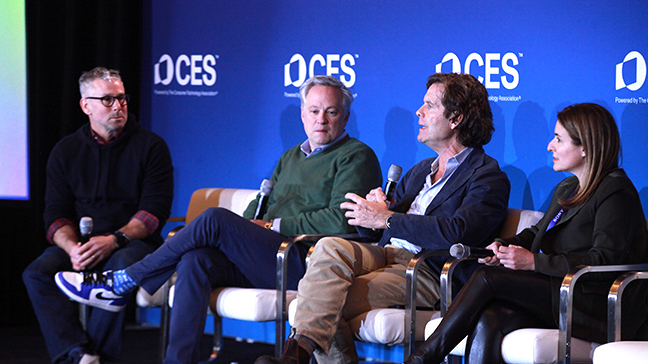There were two letters that dominated the CES 2025 floor and panels: A and I. From baby-care solutions to automated lawn mowers, AI is everywhere—and sports is no different.
At the "AI Strategies from the World’s Most Effective Sports Brands" panel at CES 2025, moderator Josh Walker, CEO, Sports Innovation Lab, led an engaging conversation about how AI is shaping aspects like personalization, interactive media rights, and new monetization opportunities in sports. He was joined by Jonathan Adashek, SVP, marketing and communications, IBM; Peter Scott, chief strategy officer, Play Anywhere; and Karina Kogan, chief marketing officer and president, iR Studio, Infinite Reality.
Walker opened the discussion with the idea of the "fluid fan." Fans are now open to change more than ever before—they are empowered to choose in an era where you can watch anything you want almost anytime you want, whether it is live television, streaming, or other content platforms.
[CES Keynote Explores Audio Evolution]
The fluid fan has created a challenge: Consumers are continuously evolving, so it's harder to target fans because their behaviors change as technologies change. That’s why, Walker explained, you have to understand the industry you are working in to apply AI. The more you learn about your consumer, the larger an advantage you have.
So, how is AI going to change sports?
Scott suggested that AI can be used to conceptualize content to be delivered to the viewer while they are watching live video or sports. Maybe one day there can be a personalized channel just for the viewer that consists of their favorite sports teams. But that starts with understanding and demystifying the technology—in this case, artificial intelligence.
“If you have anxiety about something, just start playing with it,” Scott said, challenging the audience to download ChatGPT and start dabbling. “It is super powerful and unbelievably useful. AI will change everything we do.”
Kogan’s Infinite Reality, which acquired the Drone Racing League about nine months ago, is an immersive technology company that built a platform that gives sports fans the ability to build augmented reality, immersive worlds, and 3D spaces. The platform uses AI to democratize access to spatial computing technology, which normally requires a lot of training, and enable everyone—no matter their level of tech savviness—to build an immersive experience or become game developers and world builders.
[Walk. Crawl. Run. Keeping up with AI in 2025]
As Scott noted, we know in the world of sports the money comes things like concessions, ticketing, and merchandising. How does AI disrupt the media rights business in sports? It can help create new kinds of deals—like adding betting odds to an NBA game, for example, to bring in new viewers and generate revenue. AI can also add corporate logo overlays or personalized advertising into the immersive, virtual worlds and streams.
If AI can leverage contextual experiences on a 1:1 basis, the possibilities are endless and a win-win. Rights holders will see AI as an opportunity and not a threat, while consumers will be hyperserved with a personalized sports world at their fingertips.
IBM is no stranger to AI, as one of the pioneers of using it in its coverage of golf and tennis. Adashek pointed to IBM's watsonx solution, calling it an approach of solving problems together with clients and using GenAI to take advantage of opportunities. With watsonx, IBM hopes to change sports threefold: how fans engage, how players perform/athletes compete, and how the back office of an organization operates.
How do you get there? Data. Most companies today, Adashek observed, utilize less than 50% of their data. Now, we have the ability to unlock all that data.
“The only way to do it is with AI,” he said. “First thing that must happen is getting your data right. If you don’t get your data right, you’re going to get in a deeper hole and be further behind.”
[The Year of Now: CES Panel Explores Gen AI and Marketing in 2025]
“With all new technology, this is the reality,” Kogan said. “Adapt or die. There is so much precedent of technology coming in and everyone freaking out and everything being okay.”
Kogan pointed to the advent of blogging and how journalists thought it would change everything and eliminate their jobs. But they, too, survived and the content creator space was democratized.
A longtime New York Knicks fan, Kogan would have to pay $2,000 every night to go to the game and sit where she wanted to. Now technology brings you closer to the action. “Why would you, as the rights holder, not take advantage of that?”
Scott agreed and feels that there will be some FOMO about getting on the AI train, especially in media rights libraries. Libraries can be sold to Gen AI platforms where new rights fees will be available.

